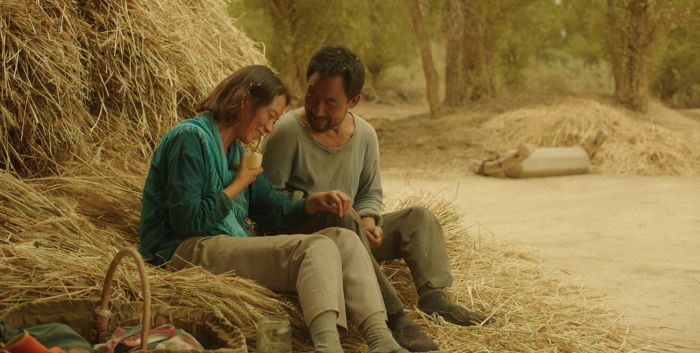![]() In China’s rural Gaotai Region (close to the southern border of Mongolia), a man and a woman, both deemed undesirable by their respective families, are married off to one another. The year is 2010. Ma Youtie (Wu Renlin), a farmer well into middle age, takes wonderful care of a donkey who is as stoic and agreeable as he is. The younger Cao Guiying (Hai Qing), who has a series of physical maladies, walks with difficulty, gets dizzy easily, and is incontinent. Though it is not overtly stated, we are led to believe that some of these injuries result from some form of abuse, others may be from a chronic and unspecified illness or simply a disability. Their families set them up in a cramped, decaying house, and they begin their marriage of convenience. In their wedding photograph, they are both sitting and not looking at each other.
In China’s rural Gaotai Region (close to the southern border of Mongolia), a man and a woman, both deemed undesirable by their respective families, are married off to one another. The year is 2010. Ma Youtie (Wu Renlin), a farmer well into middle age, takes wonderful care of a donkey who is as stoic and agreeable as he is. The younger Cao Guiying (Hai Qing), who has a series of physical maladies, walks with difficulty, gets dizzy easily, and is incontinent. Though it is not overtly stated, we are led to believe that some of these injuries result from some form of abuse, others may be from a chronic and unspecified illness or simply a disability. Their families set them up in a cramped, decaying house, and they begin their marriage of convenience. In their wedding photograph, they are both sitting and not looking at each other.
What begins in a world of dead ends and dead feelings morphs into a story of great force and beauty. Its characters do not succumb to the difficulties of life, but rise to face them. With a pace not unlike Ermanno Olmi’s The Tree of Wooden Clogs (and others that focus on the passage of time in a rural setting), Return to Dust follows Youtie and Guiying as they take incremental steps to build themselves a home. They build bricks out of mud and arrange them in an auditorium-like circle. They lay down the foundation with wooden beams in the dirt. They build their own roof, they raise chickens, and we watch as the world they set out to make slowly takes shape around them. There are, of course, setbacks: nasty weather; Guiying’s health; and an arrangement Youtie has with a local landowner to, literally, give him blood (the landowner is often ill, and Youtie has the same blood type). Not to mention that families are rapidly vacating this part of China and vacant lots are being demolished—the world around them hardly seems permanent. In spite of all this, they develop compassion for one another.
Return to Dust was a surprise success at the Chinese box office in 2022, and then promptly disappeared. Press materials state that censorship has been assumed but never confirmed. It’s easy to see why. The film presents a fairly blunt critique of how farm workers are exploited by the rich and powerful. Youtie literally gives his blood to a landowner who repeatedly does not give his tenants their due, people are evicted because of the interests of those high above, and Youtie and Guiying are forced together because other their families don’t want them.
Yet this story of censorship presents a deceptive impression of this film, for its portrait of exploitation is, in fact, one of its least distinctive aspects. It is not weak per se, but it lacks complexity. The abusers remain shadowy, less realized presences, and the result is not, like Cristian Mungiu’s R.M.N., a full-bodied examination of a moral issue from multiple angles.
The strength of Return to Dust lies in its depiction of the love between Youtie and Guiying. Yes, their story is one where people are able to find love amid great adversity, and I suppose you could call it a story about “the redemptive quality of love” and not be wrong. There is an intense physicality to their world, which director Ruijun Li captures in understated long takes. The husband and wife might be harvesting corn or simply sitting in strained silence in the early days of their marriage, and their body language speaks volumes. The pains and strains of Guiying’s condition attend her every movement, but do not stop her from running after her husband to help him, and he is often knocked down himself by the large loads he carries.
Their world is debilitating and exhausting, and their relationship, even after they have fallen in love, seems to be completely without sex. It is unclear why or if this is the case, but what we do see, as their marriage ceases to be a frigid one of convenience, are beautifully observed physical details. Youtie might hold Guiying against a roaring current as he gently washes her shoulders, and the first time she reaches toward him, the result is pulse-quickening. The absence of sexuality and the presence of extreme physical hardship give these intimate details a special impact.
Add to this that the movie is gorgeously shot, with beautiful uses of color. Youtie and Guiying are almost always wearing blue and depicted against a background of gold, brown or green, yet this is done with subtlety. There is a series of recurring shots with multiple frames (one person in a door or behind a window while the other is either in the foreground or background) that have strong cumulative force.
If the film takes minutes to get going, by the end, viewers will likely feel that the filmmaker hasn’t wasted a minute. In fact, they may want to spend more time with these characters.

















Leave A Comment